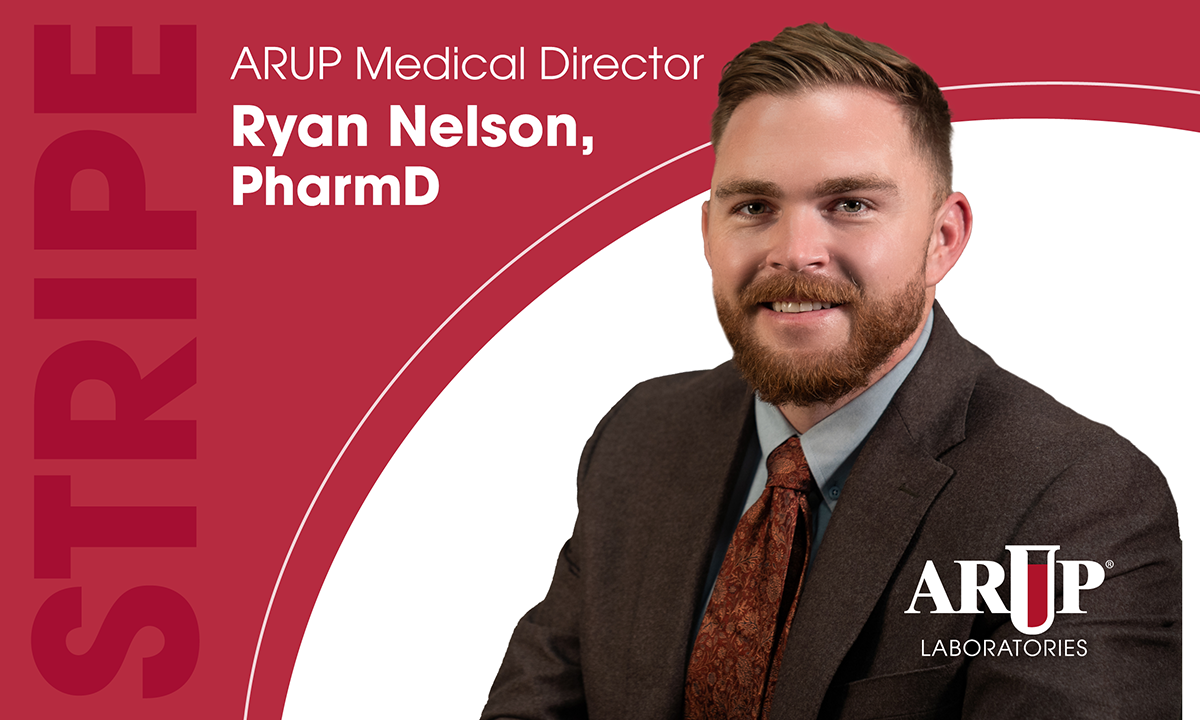
Ryan Nelson, PharmD, ARUP medical director of Precision Medicine, will moderate a session about standards for pharmacogenetic testing at the Standardizing Laboratory Practices in Pharmacogenomics (STRIPE) Annual Meeting and Consensus Workshop in October.
Ryan Nelson, PharmD, ARUP medical director of Precision Medicine, will moderate a consensus workshop during the Standardizing Laboratory Practices in Pharmacogenomics (STRIPE) Annual Meeting and Consensus Workshop October 23–25, 2024.
Formed in 2020, STRIPE is a continuing forum for building consensus around standards for integrating personalized medicine into healthcare practices. Convened by the American Society of Pharmacovigilance, STRIPE brings together myriad stakeholders, including patients, providers, regulators, and payors, to address complex challenges and achieve common objectives in the field of pharmacogenomics.
“Those who work in a field relevant to or within pharmacogenetics have a large stake in how the future looks in the field,” said Nelson, chair of the STRIPE Consensus Development Committee. “Participating in STRIPE will help stakeholders remain abreast of the most current standards and give them a forum to influence or nudge how the field moves forward.”
Nelson will moderate a session about standards for pharmacogenetic testing for DPYD gene variants. People with DPYD mutations are at increased risk of experiencing debilitating—and potentially deadly—reactions to certain chemotherapies.
“There’s been a lack of consensus on clinical implementation of a pharmacogenetic test for DPYD,” Nelson said, noting that the FDA, the European Medicines Agency, the National Comprehensive Cancer Network, and even individual clinicians all have varying opinions on the test. “We’re all reading the same literature, and we come to very different conclusions.”
The consensus workshop will provide a forum for presenting and analyzing clinical evidence about DPYD genotype-guided chemotherapy dosing. Robert Schuck, deputy director of the FDA’s Division of Translational and Precision Medicine, will offer a perspective from the FDA. Medical oncologists and payors will also provide presentations for and against DPYD genotype-guided chemotherapy dosing.
“We hope to come to a conclusion on what evidence needs to be produced in the research and what we might be able to do with the evidence that currently exists,” Nelson said.
The annual meeting will include four panel discussions and six consensus workshops. The workshops will cover a wide range of topics, such as clinical decision support, health equity, education, and study design considerations. Anonymous voting on workshop results will inform consensus-driven standards for pharmacogenomic in vitro diagnostic and lab-developed testing.
“What we want to come from these meetings is an agreement, based on the data, about the next steps for reducing barriers for patients to receive care and providing better clinical care with pharmacogenetic testing,” Nelson said.
The STRIPE Annual Meeting and Consensus Workshop will occur at the U.S. Pharmacopeia Campus in Rockville, Maryland. Registration is available at www.stopadr.org/events.
Heather Stewart, heather.stewart@aruplab.com
















